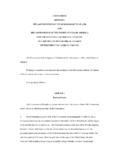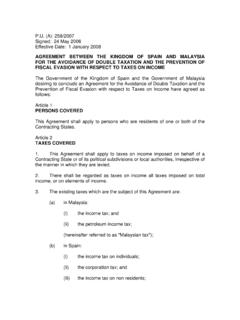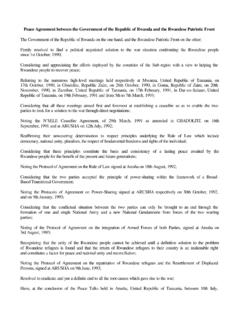Transcription of AGREEMENT BETWEEN THE GOVERNMENT OF …
1 AGREEMENT BETWEEN THE GOVERNMENT OF THE kingdom OF THAILAND AND THE GOVERNMENT OF MALAYSIA FOR THE AVOIDANCE OF double taxation AND THE prevention OF FISCAL EVASION WITH RESPECT TO TAXES ON INCOME The GOVERNMENT of the kingdom of Thailand and the GOVERNMENT of Malaysia Desiring to conclude an AGREEMENT for the avoidance of double taxation and the prevention of fiscal evasion with respect to taxes on income, Have agreed as follows: CHAPTER I SCOPE OF THE AGREEMENT ARTICLE 1 PERSONAL SCOPE This AGREEMENT shall apply to persons who are residents of one or both of the Contracting States.
2 ARTICLE 2 TAXES COVERED 1. This AGREEMENT shall apply to taxes on income imposed by each Contracting State, irrespective of the manner in which they are levied. 2. The existing taxes to which the AGREEMENT shall apply are: (a) in the case of Malaysia: (i) the income tax and excess profit tax; (ii) the supplementary income taxes, that is, tin profits tax, development tax and timber profits tax; and (iii) the petroleum income tax; (hereinafter referred to as "Malaysian tax").
3 (b) in the case of Thailand: (i) the income tax; (ii) the petroleum income tax; (hereinafter referred to as "Thai tax"). 3. The AGREEMENT shall also apply to any identical or substantially similar taxes on income which are imposed after the date of signature of this AGREEMENT in addition to, or in place of, the existing taxes. The competent authorities of the Contracting States shall notify each other of important changes which have been made in their respective taxation laws. CHAPTER II DEFINITIONS ARTICLE 3 GENERAL DEFINITIONS 1.
4 In this AGREEMENT , unless the context otherwise requires: (a) the term "Malaysia" means the Federation of Malaysia,and includes any area adjacent to the territorial waters of Malaysia which in accordance with international law, has been or may hereafter be designated, under the laws of Malaysia concerning the continental shelf, as an area within which the rights of Malaysia with respect to the sea bed and sub-soil and their natural resources may be exercised.
5 (b) the term "Thailand" means the kingdom of Thailand and includes any area adjacent to the territorial waters of the kingdom of Thailand which by Thai legislation, and in accordance with international law, has been or may hereafter be designated as an area within which the rights of the kingdom of Thailand with respect to the sea bed and sub-soil and their natural resources may be exercised; (c) the terms "a Contracting State" and "the other Contracting State" mean Malaysia or Thailand, as the context requires; (d) the term "person" includes an individual, a company and any other body of persons which is treated as an entity for tax purposes; (e) the term "company" means any body corporate or any entity which is treated as a body corporate under the taxation laws of the respective Contracting States.
6 (f) the term "enterprise of a Contracting State" and "enterprise of the other Contracting State "mean respectively an enterprise carried on by a resident of a Contracting State and an enterprise carried on by a resident of the other Contracting State; (g) the term "tax" means Malaysian tax or Thai tax, as the context requires; (h) the term "national" means: (i) any individual possessing the citizenship of a Contracting state; (ii) any legal person, partnership, association and any other entity deriving its status as such from the laws in force in a Contracting State.
7 (i) the term "international traffic" means transport by a ship or aircraft operated by an enterprise of a Contracting State, except where the ship or aircraft is operated solely BETWEEN places in the other Contracting State; (j) the term "competent authority" means: (i) in the case of Malaysia, the Minister of Finance or his authorised representative; (ii) in the case of Thailand, the Minister of Finance or his authorised representative.
8 2. In the application of the AGREEMENT by a Contracting State, any term not otherwise defined shall, unless the context otherwise requires, have the meaning which it has under the laws of that Contracting State relating to the taxes which are the subject of the AGREEMENT . ARTICLE 4 RESIDENT 1. For the purposes of this AGREEMENT , the term "resident of a Contracting State" means: (a) in the case of Thailand, a person who is resident in Thailand for the purposes of Thai tax; and (b) in the case of Malaysia, a person who is resident in Malaysia for the purposes of Malaysian tax.
9 2. Where by reason of the provisions of paragraph 1 an individual is a resident of both Contracting States, then his status shall be determined in accordance with the following rules: (a) he shall be deemed to be a resident of the Contracting State in which he has a permanent home available to him. If he has a permanent home availble to him in both Contracting States, he shall be deemed to be resident of the Contracting State with which his personal and economic relations are closer (centre of vital interests).
10 (b) if the Contracting State in which he has his centre of vital interests cannot be determined, or if he has not a permanent home available to him in either Contracting State, he shall be deemed to be a resident of the Contracting State in which he has an habitual abode; (c) if he has an habitual abode in both Contracting States or in neither of them, he shall be deemed to be a resident of the Contracting State of which he is a national; (d) if he is a national of both Contracting States or of neither of them, the competent authorities of the Contracting States shall settle the question by mutual AGREEMENT .












